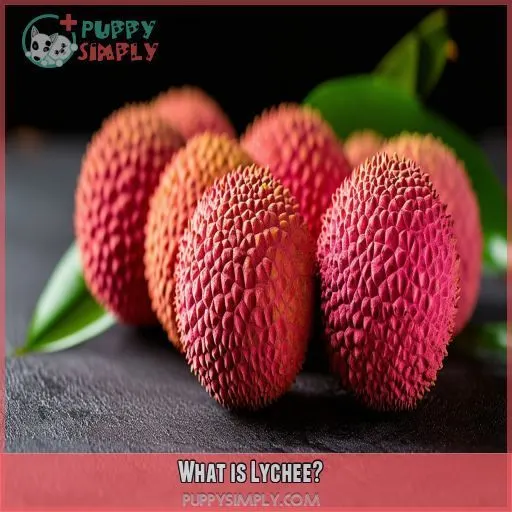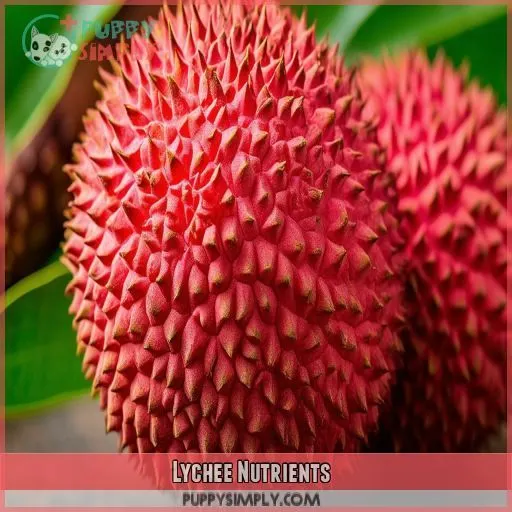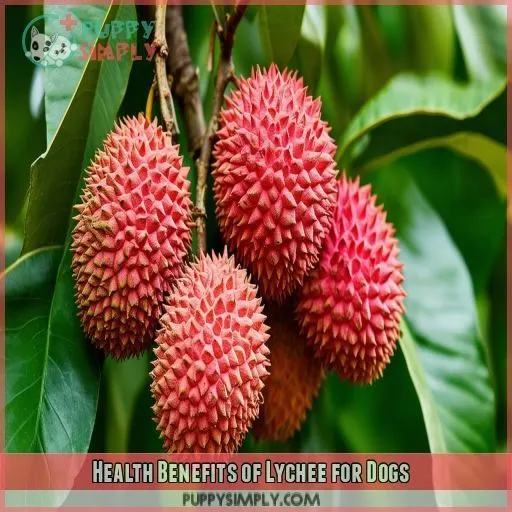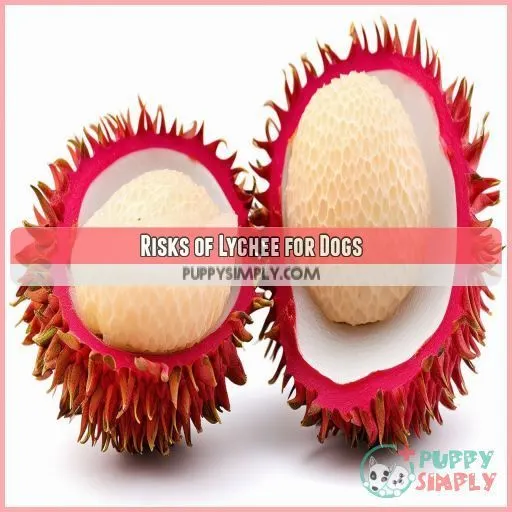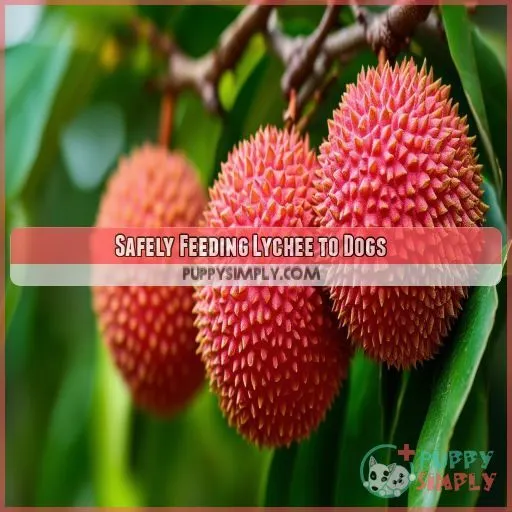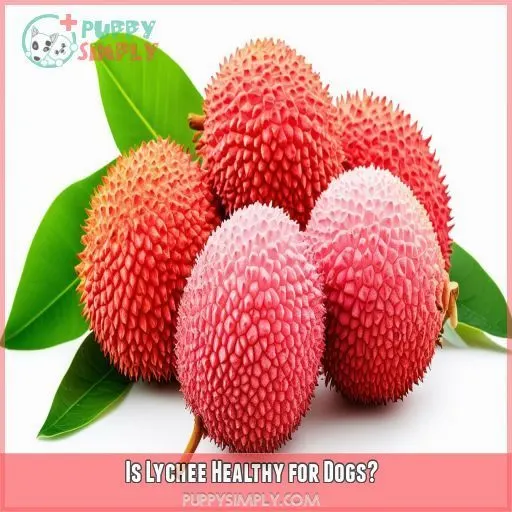This site is supported by our readers. We may earn a commission, at no cost to you, if you purchase through links.
 Yes, dogs can eat lychee, but with caution. Ripe lychee flesh is safe for your furry friend in moderation, offering benefits like fiber and nutrients.
Yes, dogs can eat lychee, but with caution. Ripe lychee flesh is safe for your furry friend in moderation, offering benefits like fiber and nutrients.
However, it is important to remove the skin and pit, as they pose choking hazards. Unripe lychees are toxic, so stick to fully ripened fruit.
While lychees can support your dog’s immune system and potentially slow cognitive aging, their high sugar content means they should be an occasional treat.
Always introduce new foods gradually and watch for any adverse reactions. Remember, moderation is key when it comes to fruity indulgences for your pup.
Let’s explore how to safely incorporate this exotic treat into your dog’s diet.
Table Of Contents
- Key Takeaways
- What is Lychee?
- Lychee Nutrients
- Can Dogs Eat Lychee Fruit?
- Health Benefits of Lychee for Dogs
- Risks of Lychee for Dogs
- Safely Feeding Lychee to Dogs
- Symptoms of Lychee Poisoning in Dogs
- Alternatives to Lychee for Dogs
- What Should a Healthy Dog Diet Look Like?
- Is Lychee Healthy for Dogs?
- Frequently Asked Questions (FAQs)
- Are lychees toxic to dogs?
- Are any fruits poisonous to dogs?
- Who should not eat lychee?
- What is the safest fruit for dogs?
- Can dogs eat lychee pits?
- Are lychees good for weight loss?
- Can dogs eat unripe lychees?
- Can dogs eat lychee fruit?
- Is lychee good for dogs?
- Can dogs eat lychee without skin?
- How much lychee can a dog safely eat?
- Can puppies eat lychee?
- Are there any breed-specific concerns with feeding lychee?
- How often can dogs have lychee as a treat?
- Does lychee affect dogs with certain health conditions differently?
- Conclusion
Key Takeaways
- Ripe lychee flesh is safe for dogs in moderation, but it’s crucial to play it safe and remove the skin and pit – those are definite no-nos that could lead to a ruff time for your furry friend!
- Think of lychee as the canine equivalent of a fancy dessert – a little goes a long way. Its high sugar content means it should be an occasional treat, not a daily indulgence. Everything in moderation, as they say!
- This tropical delight packs a nutritional punch with fiber, vitamins, and antioxidants that can give your pup’s immune system a tail-wagging boost. Just don’t go overboard – too much of a good thing can lead to tummy troubles.
- When in doubt, always consult your vet before introducing new foods to your dog’s diet. They’re the experts who can help you navigate the fruity waters and ensure your pooch stays healthy and happy. Better safe than sorry, right?
What is Lychee?
Ever wondered about that exotic fruit with a bumpy red skin and translucent white flesh? That’s lychee, a tropical delight with a rich history.
Originating in China over 2,000 years ago, this fruit has since spread to warmer regions worldwide, including parts of the U.S., India, and Australia. Lychee cultivation has given rise to various varieties, each with its unique flavor profile. In Chinese culture, lychee symbolizes romance and nobility.
But what about your furry friend? While lychee can offer some benefits for dogs, it’s not all smooth sailing. The safety of lychee for dogs depends on how it’s prepared and consumed.
Before you share this sweet treat with your pup, it’s important to understand its potential impacts on canine health. Let’s explore the juicy details!
Lychee Nutrients
Lychee is a nutrient-dense fruit that’s low in calories but rich in essential nutrients. A serving of lychee contains 68 calories, 83 grams of protein, 44 grams of fat, 5 grams of carbohydrates, and 3 grams of dietary fiber.
Calories: 68 Kcal
You’ll be pleased to know that lychee’s a low-calorie treat for your furry friend. This exotic fruit from tropical regions packs just 68 calories per 100 grams, making it a sweet, guilt-free snack.
Protein: 83 Grams
You’ll find 83 grams of protein in lychee, which might surprise you. It’s essential to understand this nutrient’s role in your dog’s diet.
- Excitement: Discover the unexpected protein punch in lychee!
- Concern: Could this high protein content affect your pup’s health?
- Curiosity: How does lychee’s protein compare to other fruits?
- Relief: Learn to safely incorporate this protein source into your dog’s meals.
Fat: 44 Grams
You’ll find lychee’s fat content surprisingly low at 44 grams. This contributes to its low calorie count, making it a light treat for your pup.
| Nutrient | Amount | % Daily Value |
|---|---|---|
| Fat | 44g | 0.7% |
| Protein | 83g | 1.7% |
| Fiber | 3g | 12% |
Carbohydrates: 16.5 Grams
While lychees are low in fat, they’re higher in carbs. You’ll find 16.5 grams of carbohydrates in a serving, mostly from natural sugars. Be mindful when feeding your pup.
Dietary Fiber: 3 Grams
You’ll find lychees contain 3 grams of dietary fiber per serving. This fiber offers:
- Improved digestive health
- Better weight management
- Regulated blood sugar levels
- Enhanced immune support
It’s a nutrient-packed bonus!
Can Dogs Eat Lychee Fruit?
After exploring lychee’s nutrient profile, you’re probably wondering if it’s safe for your furry friend. The answer isn’t a simple yes or no. While ripe lychee flesh can be a tasty treat for dogs, it’s imperative to exercise caution.
You’ll need to remove the skin and pit, as these pose serious risks. The skin can cause intestinal blockages, while the pit contains saponin, a toxic compound. Unripe lychee is a big no-no, as it’s toxic for both humans and animals.
In terms of the flesh, moderation is key. Lychee’s high sugar content means it should be an occasional indulgence, not a daily snack.
If you’re considering adding lychee to your pup’s diet, it’s wise to consult your vet first. They can advise on proper serving sizes and potential alternatives.
Health Benefits of Lychee for Dogs
Lychee can offer several health benefits for your dog when given in moderation. This tropical fruit is rich in fiber, low in calories, and packed with nutrients like vitamins, minerals, and antioxidants that can support your dog’s immune system.
Rich in Fiber
While dogs can enjoy ripe lychee in moderation, it’s the fiber content that really shines. Fiber aids digestion and promotes gut health, offering tangible benefits for your furry friend’s overall well-being.
Low-calorie Snack
You’ll be pleased to know that lychee is a low-calorie snack for your furry friend. With careful Lychee consumption, you can treat your dog without worrying about excess weight gain. It’s a guilt-free indulgence in moderation.
Nutrient-rich, Containing Vitamins, Minerals, and Antioxidants
You’ll be pleased to know that lychees pack a nutritional punch for your furry friend. They’re loaded with antioxidants, minerals, and vitamin C. The fiber content aids digestion, while these nutrients work together to boost your dog’s overall health.
Can Support the Immune System
Lychee’s antioxidants and anti-inflammatory properties can boost your dog’s immune system. They’ll help fight off illnesses and support heart health. Plus, these little fruits might even slow down cognitive aging in your furry friend.
Risks of Lychee for Dogs
While lychee can offer some benefits, it’s important to be aware of the risks. Unripe lychee contains harmful toxins that can be dangerous for your dog, and the pit and seed pose a serious choking hazard if accidentally ingested.
Unripe Lychee Contains Harmful Toxins
You’ll want to avoid unripe lychees for your furry friend. These seemingly innocent fruits can pack a toxic punch for dogs. Here’s what you need to know about lychee toxicity:
- Unripe lychees contain harmful compounds
- Saponin in seeds can cause poisoning
- Hypoglycin A in unripe fruit may lead to severe illness
- Removing seeds is essential for safety
Always err on the side of caution and stick to fully ripened, seedless lychee flesh for your pup’s safety.
Pit and Seed Can Be a Choking Hazard
While unripe lychees pose toxicity risks, the pit and seed aren’t any safer. You’ll want to be vigilant about seed removal techniques to prevent choking hazards.
These hard components can easily get lodged in your dog’s throat or cause intestinal blockages.
To safeguard your furry friend’s canine digestion, consider offering alternative fruits instead.
Safely Feeding Lychee to Dogs
To safely feed lychee to your dog, make sure it’s ripe and remove the outer skin and pit before offering it in moderation. It’s important to avoid large quantities and consult with your veterinarian before introducing lychee into your dog’s diet.
Ensure Lychee is Ripe
When feeding lychee to your dog, make certain it’s fully ripe. Unripe fruit can be toxic, especially for puppies. Ripe lychees offer benefits for senior dogs, but watch for allergies.
Remove Outer Skin and Pit
Before offering lychee to your dog, remove the rough skin and pit. The skin’s texture poses an intestinal blockage risk, while the seed contains toxic compounds. Enjoy the safe, fiber-rich flesh.
Provide in Moderation
When offering lychee to your dog, moderation is key. Ripe lychee can be a tasty treat, but overindulgence may lead to digestive issues. Stick to small portions and monitor your pup’s reaction.
Avoid Large Quantities
While moderation is key, it’s essential to avoid large quantities of lychee for your dog. Overdoing it can lead to:
- Upset tummy and digestive issues
- Potential toxicity from unripe fruit
- Increased risk of choking hazards
Consult With a Veterinarian
Before introducing lychee to your dog’s diet, consult your vet. They’ll assess potential Lychee toxicity, allergies, and interactions, ensuring your pup’s safety. Consider Lychee alternatives to avoid overfeeding risks.
Symptoms of Lychee Poisoning in Dogs
If your dog has eaten lychee, watch for signs of poisoning such as dark urine, extreme drooling, muscle spasms, seizures, and stomach cramps. These symptoms can indicate a serious reaction, and you should contact your veterinarian immediately if you notice any of them in your pet.
Dark Urine
If your dog eats lychee, watch for dark urine. It’s a telltale symptom of lychee poisoning. This discoloration can indicate serious health issues.
- A transparent water bowl turning murky
- Your pup’s usual potty spot stained an alarming shade
- Droplets on grass looking more like spilled ink than urine
Extreme Drooling
If you notice your dog drooling excessively after eating lychee, it’s a red flag. This symptom could indicate lychee toxicity in dogs, warranting immediate veterinary attention.
Muscle Spasms
If you notice your dog experiencing muscle spasms after eating lychee, it’s a red flag for poisoning. These involuntary contractions are a serious symptom requiring immediate veterinary attention.
Seizures
If your dog’s eaten lychee, watch for seizures. These can be life-threatening signs of poisoning. Be alert for:
- Sudden, uncontrolled body movements
- Loss of consciousness
- Foaming at the mouth
Seek immediate veterinary care if you notice these symptoms.
Stomach Cramps
While seizures are severe, stomach cramps are another sign of lychee poisoning in dogs. Here’s what you need to know:
| Cause | Symptoms | Action |
|---|---|---|
| Unripe lychee | Abdominal pain, vomiting | Seek vet help |
| Lychee seeds/skin | Digestive distress | Remove from diet |
| Lychee toxicity | Persistent discomfort | Monitor closely |
Alternatives to Lychee for Dogs
If you’re looking for safer alternatives to lychee for your dog, consider offering fruits like dragon fruit, apples, bananas, blueberries, or strawberries. These options provide various nutrients and are generally safe for canine consumption when given in moderation and prepared appropriately.
Dragon Fruit
Dragon fruit is a safe, non-toxic alternative to lychee for your canine companion. It’s packed with nutrients and fiber, making it a healthy treat your dog will love.
Apples
Apples are a fantastic alternative to lychee for your furry friend. They’re packed with nutrients that support heart health, aid in cancer prevention, and may even help with diabetes prevention.
Bananas
While apples are great, bananas are another fantastic alternative to lychee for your pup. They’re packed with nutrients and offer several benefits:
- Potassium-rich for heart health
- Easily digestible
- Low in calories
- Natural skin soother
Blueberries
Blueberries are a fantastic lychee alternative for dogs. They’re packed with antioxidants and offer numerous health benefits. Here’s a quick comparison:
| Nutrient | Blueberries | Lychee |
|---|---|---|
| Calories | 57 per cup | 66 per cup |
| Fiber | 3.6g | 2.5g |
| Vitamin C | 24% DV | 151% DV |
| Toxicity | Safe | Risky |
Strawberries
Strawberries are a safer, delicious alternative to lychee for your furry friend. They’re packed with antioxidants and fiber, making them a healthy treat without the risks associated with lychee.
What Should a Healthy Dog Diet Look Like?
A healthy dog diet should include a balanced mix of proteins, fats, carbohydrates, minerals, and vitamins. You’ll want to guarantee your dog gets high-quality protein sources, essential fatty acids, digestible carbs, and a variety of vitamins and minerals to support their overall health and well-being.
Proteins
While lychee alternatives offer variety, proteins are the cornerstone of your dog’s diet. They’re essential for muscle growth and repair, outweighing the benefits of occasional lychee treats.
Fats
Just like proteins, fats are essential for your dog’s health. They provide energy, support cell function, and aid nutrient absorption. But not all fats are created equal.
Carbohydrates
While carbs aren’t essential for dogs, they can provide energy and fiber. Opt for complex carbohydrates like sweet potatoes or brown rice in moderation. Avoid lychee-based treats.
Minerals
Your dog’s diet should include essential minerals like calcium and phosphorus. Quality dog food often provides these, but some pups may need nutritional supplements for ideal canine health.
Vitamins
You’ll want to make sure your dog’s diet includes essential vitamins. These work with minerals to support overall health. Here are key vitamins for canine nutrition:
- Vitamin A
- Vitamin D
- Vitamin E
- B-complex vitamins
These antioxidants and dietary fiber offer numerous health benefits.
Is Lychee Healthy for Dogs?
Lychee can offer some health benefits for dogs when given in moderation. Its high vitamin C content may help reduce inflammation and cognitive aging, while also providing dietary fiber to support digestive health.
High Vitamin C Levels Can Be Beneficial
You’ll be glad to know that lychee packs a powerful punch of vitamin C. This antioxidant powerhouse can boost your dog’s immune system and overall health. However, it’s essential to remember that moderation is key when offering this tropical treat to your furry friend.
Can Reduce Inflammation and Cognitive Aging
You’ll be happy to know that lychee’s antioxidant benefits can help your furry friend. It’s not just a low-calorie snack; the fruit’s vitamin C content supports your dog’s immune system and may slow cognitive decline. However, remember to offer it in moderation for the best health benefits.
Provides Dietary Fiber
Lychee’s dietary fiber can be a digestive aid for your dog. This tropical fruit offers several benefits:
- Supports healthy digestion
- Helps maintain regular bowel movements
- Promotes a feeling of fullness
With its low calories and antioxidant properties, lychee can be a nutritious treat that supports your pup’s immune system.
Frequently Asked Questions (FAQs)
Are lychees toxic to dogs?
Lychees can be toxic to your dog. While ripe flesh is safe in moderation, unripe fruit, skin, and seeds are dangerous. They can cause hypoglycemia, intestinal blockage, and poisoning. Always remove skin and seeds before offering small amounts.
Are any fruits poisonous to dogs?
You might be surprised to learn that some common fruits can be deadly for your furry friend. Grapes and raisins top the list, causing kidney failure. Other dangerous fruits include avocados, cherries, and unripe persimmons. Always check before treating your pup!
Who should not eat lychee?
You shouldn’t eat lychee if you’re pregnant, have diabetes, or allergies to the fruit. Children and those with low blood sugar should also avoid it. If you’re on certain medications, consult your doctor before indulging.
What is the safest fruit for dogs?
Picture a vibrant rainbow of dog-safe fruits. You’ll find blueberries, strawberries, and watermelon leading the pack. They’re packed with nutrients, low in calories, and easy to digest. Remember, moderation’s key to keeping your pup’s tail wagging healthily.
Can dogs eat lychee pits?
No, dogs shouldn’t eat lychee pits. They’re a choking hazard and contain saponin, which is toxic to dogs. Always remove the pit and skin before offering your pup a small piece of ripe lychee flesh as an occasional treat.
Are lychees good for weight loss?
Did you know lychees are 82% water? They’re low in calories, making them a great weight loss snack. You’ll get fiber and essential nutrients while satisfying your sweet tooth. Just don’t overdo it—moderation is key for any diet.
Can dogs eat unripe lychees?
No, you shouldn’t let your dog eat unripe lychees. They’re toxic and can cause severe health issues, including hypoglycemia. Stick to ripe lychees in moderation, removing the skin and pit before offering them as an occasional treat.
Can dogs eat lychee fruit?
Sweet as a summer breeze, lychee can be a tasty treat for your furry friend. You can offer ripe lychee flesh in moderation, but always remove the skin and pit. Watch for any adverse reactions.
Is lychee good for dogs?
Lychee isn’t ideal for dogs. While it offers some nutrients, the risks outweigh the benefits. You’re better off sticking to dog-friendly fruits like apples or blueberries. If you must, offer tiny amounts of ripe, peeled lychee occasionally.
Can dogs eat lychee without skin?
While Fido might enjoy a fruity treat, you’ll want to proceed cautiously. Dogs can eat ripe lychee flesh without skin, but it’s essential to remove the outer layer and pit. Offer small amounts as an occasional snack.
How much lychee can a dog safely eat?
You can safely feed your dog 1-2 small pieces of ripe, peeled lychee as an occasional treat. It’s essential to remove the skin and pit. Always monitor your pup for any adverse reactions and consult your vet if concerned.
Can puppies eat lychee?
An ounce of prevention is worth a pound of cure. It’s best to avoid feeding lychee to puppies. Their developing digestive systems are sensitive, and the risks outweigh any benefits. Stick to puppy-safe treats recommended by your vet.
Are there any breed-specific concerns with feeding lychee?
While breed-specific concerns aren’t significant, smaller dogs may be more sensitive to lychee’s high sugar content. Large breeds could choke on improperly prepared fruit. Always remove the skin and pit, and introduce lychee gradually, regardless of your dog’s size.
How often can dogs have lychee as a treat?
You can offer your dog lychee as an occasional treat, once or twice a week at most. Keep portions small, about 1-2 pieces for smaller breeds and 3-4 for larger dogs. Always monitor for any adverse reactions.
Does lychee affect dogs with certain health conditions differently?
Lychee can be a ticking time bomb for dogs with certain health issues! You’ll want to watch out if your pup has diabetes, obesity, or digestive problems. It’s best to consult your vet before offering this sweet treat.
Conclusion
Ironically, the exotic lychee fruit, often seen as a human delicacy, can be a surprising treat for your canine companion. Now that you know dogs can eat lychee, you’re equipped to offer this unique snack safely.
Remember to serve only ripe, peeled, and pitted lychees in moderation. While they offer potential health benefits, be vigilant for any adverse reactions.
Balance is key in your dog’s diet, so consider lychee as an occasional treat alongside other dog-friendly fruits. Always consult your vet before introducing new foods to your pup’s menu.

